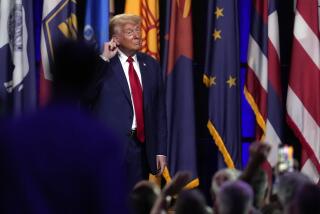Egypt president uses tweets to convey kinder, gentler side

CAIRO — President Mohamed Morsi, at least for the moment, appears to be channeling his softer side.
The beleaguered Egyptian leader this week withdrew criminal complaints filed by his office against journalists and began nightly chats with anyone who might care to send him a tweet. The moves were calculated to calm the opposition and placate an international community dismayed by his authoritarian tendencies.
Neither charismatic statesman nor eloquent visionary, Morsi nonetheless seems to be attempting to calm the nation’s multiplying ills with uncharacteristic gestures. He has little choice: The economy is crumbling, gas shortages are spreading, the inflation rate is rising, labor strikes are threatening, sectarian tensions are simmering and protests are chipping at the state’s stability.
But the president, who does not come across as a nimble-fingered tweeter, has become a magnet for derision and parody by a population gifted at wordplay and humor. A Facebook post that pokes fun at Morsi’s oratory depicts a bearded man offering the bespectacled leader some advice:
“The people are tired, Mr. President, and you have to go out to talk to them. Even if you don’t solve things, at least you’ll make them laugh.”
Such sentiment prompted Morsi and his Muslim Brotherhood, which controls the government and whose political instincts tilt toward blunt aggression rather than compromise, to shift strategies.
In perhaps its most significant move this week, the government floated the possibility of amending contentious articles on civil rights in the new constitution. Secular political groups and human rights organizations deride the charter, drafted by Islamists and hurried through in a referendum, as the path to a fundamentalist state.
It is unclear whether Morsi’s conciliatory approach is a political ploy or a genuine pivot to draw in opponents and guide the country out of chaos at a time when many are calling for the military to return to power. Egypt often feels as if it is gasping, hurtling from crisis to crisis through scrims of tear gas and the unrequited hopes of the revolution that overthrew President Hosni Mubarak two years ago.
Morsi’s announcements this week were played up by his office to show an engaged president committed to democracy. Morsi ended investigations of journalists who wrote negative stories about his government because he wanted to show “ respect for freedom of expression and freedom of the press,” according to a presidential spokesman.
But the move covered only investigations filed by Morsi’s office. It did not include separate inquiries on journalists and writers filed by citizens and Islamist lawyers. The president’s edict also did not free popular television satirist Bassem Youssef from dozens of criminal complaints filed by Brotherhood sympathizers.
In a report on Morsi’s Twitter engagement with the populace, the Egypt Independent suggested Thursday that people wanted fewer slogans and more candor on issues such as medical care, food subsidies and why Morsi’s followers refer to his political opponents as thugs.
“We seek to achieve the mottoes of the revolution, including bread, freedom, social justice and human dignity, and we want you to give us a hand,” tweeted Morsi.
The president received a terse reply from Wael Molla, a publisher: “What does the answer have to do with the question? …Do you understand the question, Mr. President?”
Amid the tweeting and legal revelations, Morsi received a bit of good news: Qatar pledged to buy $3 billion in bonds to help Egypt’s ailing economy. That comes on top of a $2-billion investment promise from the energy-rich Persian Gulf nation.
But, as has been the case with Egypt since 2011, the prospect of fresh turmoil didn’t seem far behind. Mubarak’s retrial on murder charges is set to begin Saturday, agitating passions ahead of what many anticipate to be a long, desert summer of blackouts and rage.
Special correspondent Ingy Hassieb contributed to this report.
More to Read
Sign up for Essential California
The most important California stories and recommendations in your inbox every morning.
You may occasionally receive promotional content from the Los Angeles Times.











